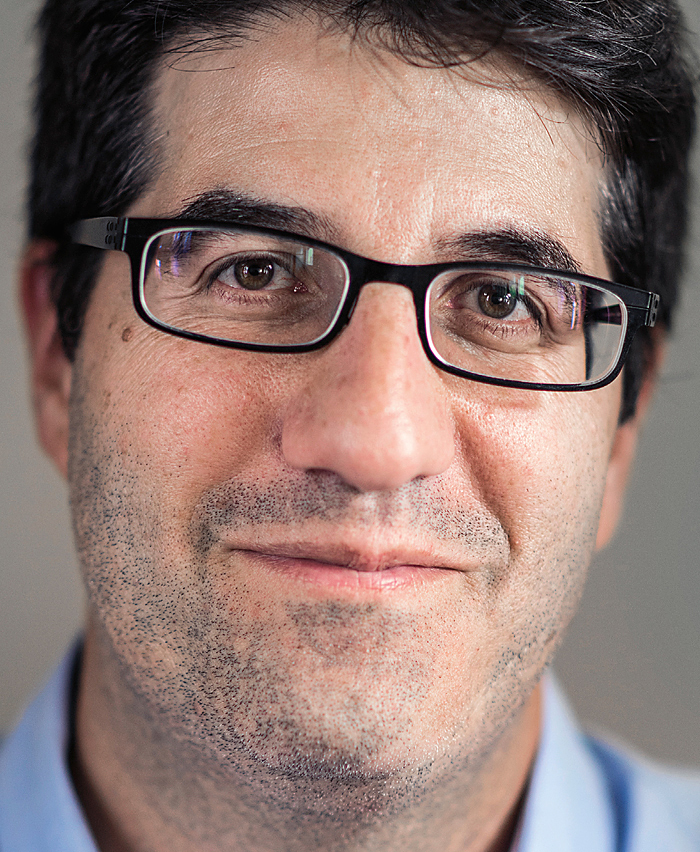
As a writer and producer for The Simpsons, Joel Cohen has brought laughter into the homes of audiences all over the world.
I wanted to go somewhere other than Calgary, where I'd grown up, and much to the U of A's dismay, I'm sure, they let me in. It just seemed more exotic. I did pre-med because I thought, "OK, I'll just take the hardest thing I can and then every road will still be open to me." That line of thinking will establish what an idiot I was. I failed organic chemistry, took it again and still only barely passed. So I left pre-med and took the science courses I was interested in, like zoology, which eventually led to a biology degree. After my degree I took another half year and just took every class that interested me, things like anthropology and computer programming. That allowed me to get a better sense of what I wanted to do with my life.
To do an MBA at York University, actually.
An MBA?!I managed to waste a great education in one fell swoop. I honestly can't remember a single thing I learned there.
So this led to working in high finance on Bay Street?Umm, no. I worked in Toronto for five years for a now-bankrupt film distribution company in its home video department, which allowed me to sell the worst possible movies you could ever imagine on VHS to video stores across Canada.
As a Canadian, what do you think you bring to the writer's room for The Simpsons?It's possible that at one point I had a Canadian influence on the show, but now I feel like I have Stockholm Syndrome, where I affiliate with my captors. Really, I feel like I've been indoctrinated into The Simpsons sense of humour rather than me bringing anything in from outside. I think the only thing that separates me is that frequently a word will come up, like "decal" [editor's note: many Americans pronounce it dee-cal]. I said decal in the room the other day and it literally stopped work for two hours, because no one else knew what a decal was and I had to spell it and explain it. It was like a caveman being discovered in a block of ice and people trying to communicate with him, it was that awkward. It was like exchanging grunts trying to understand what we were each talking about. There are lots of words like that. Every time I say "pasta" it sucks $500,000 of productivity out of the show while I explain it. I just say "noodle" now.
What do you think has given The Simpsons such longevity?The characters don't age. You can turn on a TV, right now, somewhere in the world and an episode is on and you don't know if the characters are in season 2 or 22. There's something comforting about that. It established this sense of humour and now it's evergreen. It's been around 25 years; it's what we know and can turn to.
So the show is both familiar and subversive?Well, we get away with a lot because we're animated - but by this point, we are almost one of the milder animated shows. South Park, Family Guy, American Dad, there are lots of other shows that are raunchier or more controversial. South Park does stuff we'd never do. We were more subversive when we started, but now we're subversive in a more acceptable way. We're there if someone wants a nice soothing pool of subversiveness they can bathe in and not feel bad about themselves.
And so what's next for Joel Cohen?One of the great things about The Simpsons is that some of us have the luxury of doing stuff outside the show if we can. I've worked on a few other things - some online stuff, feature films, other TV shows. I'm working with a couple colleagues and we've written and are producing an animated film to be released in 2017, which will hopefully be using a Canadian production company. I'm always dabbling. I love The Simpsons and want to stay as long as I can, but I also feel like I'm ready for the world outside the show whenever that happens.
We at New Trail welcome your comments. Robust debate and criticism are encouraged, provided it is respectful. We reserve the right to reject comments, images or links that attack ethnicity, nationality, religion, gender or sexual orientation; that include offensive language, threats, spam; are fraudulent or defamatory; infringe on copyright or trademarks; and that just generally aren’t very nice. Discussion is monitored and violation of these guidelines will result in comments being disabled.